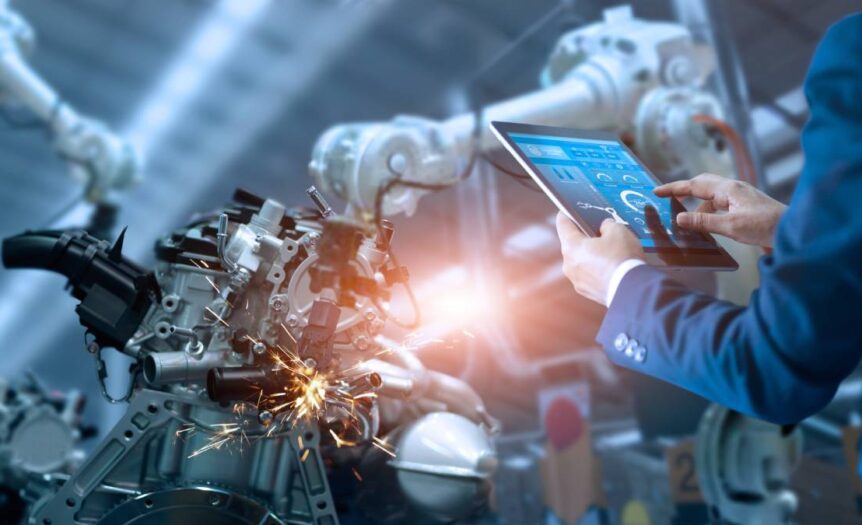Artificial intelligence (AI) is transforming the manufacturing industry, bringing efficiency, precision, and innovation to various processes. Here are some key ways AI is used to enhance manufacturing processes.
Predictive Maintenance
AI-driven predictive maintenance is a game-changer for manufacturers. By analyzing data from sensors and machinery, AI algorithms can predict when equipment is likely to fail or require maintenance. This proactive approach minimizes downtime, reduces repair costs, and extends the lifespan of machinery. Instead of reacting to equipment failures, manufacturers can schedule maintenance at optimal times, ensuring smooth and uninterrupted production processes. Predictive maintenance not only boosts efficiency but also significantly improves overall productivity.
Quality Control and Inspection
Quality control is crucial in manufacturing, and AI notably enhances this process. AI-powered systems can detect defects and inconsistencies that human inspectors might miss. Using advanced imaging technology and machine learning algorithms, AI systems analyze products in real time, ensuring they meet stringent quality standards. This leads to higher-quality products and reduces waste by catching defects early in the production process. Manufacturers benefit from improved accuracy and faster inspection times, ultimately enhancing customer satisfaction.
Supply Chain Optimization
AI plays a vital role in optimizing supply chain management. By analyzing large datasets, AI can predict demand, optimize inventory levels, and streamline logistics. This ensures that manufacturers have the right materials at the right times, reducing the risk of stockouts or overproduction. AI-driven supply chain optimization leads to cost savings and increased efficiency. It also enables manufacturers to respond quickly to market changes, improving their competitiveness in the industry. With AI, the supply chain becomes more agile and resilient.
Robotics and AI
While the terms are often used interchangeably, there are distinct differences between robotics and AI. Robotics involves the physical aspect of machines performing tasks, whereas AI focuses on the software and algorithms that drive intelligent behavior. In manufacturing, AI can enhance robotics by providing the intelligence needed for robots to perform complex tasks autonomously. For instance, AI can enable robots to adapt to new tasks without reprogramming, making the production line more flexible. Understanding these differences allows manufacturers to leverage both technologies effectively, combining physical automation with intelligent decision-making.
Now that you know how AI is used to enhance manufacturing processes, you can appreciate its impact on predictive maintenance, quality control, supply chain optimization, and robotics. As the manufacturing industry continues to evolve, staying informed about these advancements will help manufacturers remain competitive and innovative.










 Deering Estate
Deering Estate
 Massage Envy South Miami
Massage Envy South Miami
 Calla Blow Dry
Calla Blow Dry
 My Derma Clinic
My Derma Clinic
 Sushi Maki
Sushi Maki
 Sports Grill
Sports Grill
 The Healthy Kitchen
The Healthy Kitchen
 Golden Rule Seafood
Golden Rule Seafood
 Malanga Cuban Café
Malanga Cuban Café

 Kathleen Ballard
Kathleen Ballard
 Panter, Panter & Sampedro
Panter, Panter & Sampedro
 Vintage Liquors
Vintage Liquors
 The Dog from Ipanema
The Dog from Ipanema
 Rubinstein Family Chiropractic
Rubinstein Family Chiropractic
 Your Pet’s Best
Your Pet’s Best
 Indigo Republic
Indigo Republic




 ATR Luxury Homes
ATR Luxury Homes


 2112 Design Studio
2112 Design Studio
 Hamilton Fox & Company
Hamilton Fox & Company
 Creative Design Services
Creative Design Services
 Best Pest Professionals
Best Pest Professionals
 HD Tree Services
HD Tree Services
 Trinity Air Conditioning Company
Trinity Air Conditioning Company
 Cisca Construction & Development
Cisca Construction & Development
 Mosquito Joe
Mosquito Joe
 Cutler Bay Solar Solutions
Cutler Bay Solar Solutions


 Miami Royal Ballet & Dance
Miami Royal Ballet & Dance
 Christopher Columbus
Christopher Columbus
 Pineview Preschools
Pineview Preschools
 Westminster
Westminster
 Carrollton
Carrollton
 Lil’ Jungle
Lil’ Jungle
 Frost Science Museum
Frost Science Museum
 Palmer Trinity School
Palmer Trinity School
 South Florida Music
South Florida Music
 Pinecrest Orthodontics
Pinecrest Orthodontics
 Dr. Bob Pediatric Dentist
Dr. Bob Pediatric Dentist
 d.pediatrics
d.pediatrics
 South Miami Women’s Health
South Miami Women’s Health

 The Spot Barbershop
The Spot Barbershop
 My Derma Clinic
My Derma Clinic




 Miami Dance Project
Miami Dance Project

 Rubinstein Family Chiropractic
Rubinstein Family Chiropractic
 Indigo Republic
Indigo Republic

 Safes Universe
Safes Universe
 Vintage Liquors
Vintage Liquors
 Evenings Delight
Evenings Delight





 Atchana’s Homegrown Thai
Atchana’s Homegrown Thai
 Baptist Health South Florida
Baptist Health South Florida

 Laser Eye Center of Miami
Laser Eye Center of Miami
 Visiting Angels
Visiting Angels
 OpusCare of South Florida
OpusCare of South Florida

 Your Pet’s Best
Your Pet’s Best





 HD Tree Services
HD Tree Services
 Hamilton Fox & Company
Hamilton Fox & Company


 Creative Design Services
Creative Design Services